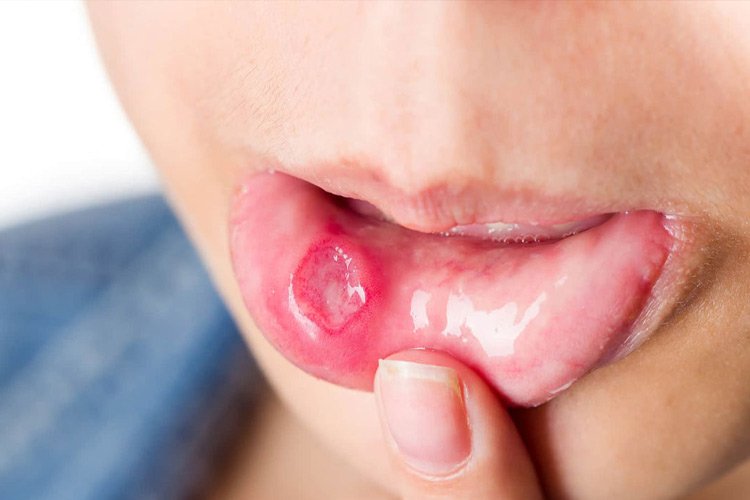
WHAT IS CAUSES OF MOUTH SORES?
Mouth Sores, also called canker sores, are painful lesions that can appear inside the cheeks, lips, or gum line. To put it scientifically, it is the loss of tissue lining in the mouth. As they are not contagious and disappear in a week or two, there is no need to be concerned.
However, it is advisable to see a dentist if these do not heal within the time frame specified or if they are significant and exceedingly painful. Sometimes the discomfort can be so severe that it makes eating, talking, and drinking uncomfortable.
WHAT CAUSES MOUTH SORES?
Mouth Sores are most common in women, children, and people with a family history of the condition. Even if the precise etiology of mouth ulcers is unknown, the following variables may contribute to the state:
BRACES RELATED MOUTH SORES
Not just your teeth must adapt to wearing braces, though. Mouth sores can become a significant irritation if you have had braces put on or altered. Daily tasks can become quite unpleasant.
Orthodontist wax is one thing you must have to alleviate mouth sores from braces. Although it is not intended to ease pain or hasten the healing process, applying this wax to your braces can help stop mouth ulcers from worsening. It is typically supplied by your orthodontist but is also available at pharmacies.
DENTURE RELATED MOUTH SORES
New or older dentures that don’t fit properly can rub against your gums or the inside of your mouth, similar to how braces can, leading to uncomfortable mouth sores. Talk to your dentist about possible changes and other pain reduction options if you have mouth sores caused by new or improperly fitting dentures.
TREATMENT FOR MOUTH SORES
Most mouth sores heal on their own in 10–14 days. However, several over-the-counter drugs, such as Renewing Melts, can help pain management and promote natural healing (HB-12 Melts). There are also several natural treatments for mouth sores, such as:
RINSE WITH SALT WATER
Apply a paste made of baking soda and water to sores areas.
Avoid foods and beverages that are spicy, hot, salty, or acidic to avoid triggers.
CARE FOR MOUTH SORES
Mouth sores do not require treatment because they heal on their own. However, if the sores are huge and excruciatingly painful, please see your dentist for possible treatments:
- Rinse with baking soda and salt water.
- Use topical painkillers like Orajel or Anbesol.
- Canker sores can be treated with ice or cold water.
- applying used tea bags to the wounds
- Savor a cup of chamomile tea.
- Another excellent choice is the milk of magnesia, which is suggested for use on mouth ulcers.
HOW CAN MOUTH SORES BE AVOIDED?
- Consume a nutritious, balanced diet.
- Steer clear of acidic and spicy foods and drinks.
- gently brush
- Take in a lot of water.
- Use strategies to lessen stress
- Get enough rest.
TYPES MOUTH SORES
There are many different kinds of uncomfortable and painful sores. The most typical of these are:
CANKER SORES
These little white spots have red borders. Being non-contagious, the source or reason is unknown. However, trauma is typically cited as the main factor. They may take a week and a half to recover on their own entirely. Foods that are spicy, acidic, or citrusy should be avoided.
COMMON COLD
These develop outside the mouth in a cluster of red, raised blisters, especially on the lips. These contain liquid, which, when they shatter, could leak. Despite being quite contagious, they heal independently after a week or so.
CANDIDIASIS
A yeast infection develops on soft, moist tissue inside the mouth. It appears as a patch of white with a crimson background. Fungus is the origin of these sores, and individuals with weakened immune systems, compromised health, or diabetic patients are more susceptible to acquiring them. If candidiasis is the cause of the sore, a dental professional should be consulted.
LEUKOPLAKIA
Anywhere in the mouth, these rough white patches can be found. Although they are neither painful nor contagious, these can raise more severe issues. In this situation, it is suggested that you see a dental professional.
TREATMENT COST OF MOUTH SORES?
Early treatment of mouth ulcers is necessary to prevent additional costs that could arise down the road if the condition is not addressed. It would help if you contacted the closest Best Dental clinic in Dubai for the most acceptable costs.
FREQUENTLY ASKED QUESTIONS
Do Mouth Sores Increase Your Risk of Oral Cancer?
Oral cancer can develop from sore mouth ulcers that do not naturally heal and linger for several weeks. Anywhere in the mouth can create a mouth ulcer, but those that form under the tongue are particularly problematic. For such cancer-related ulcer alerts, schedule an appointment.
How Are Mouth Sores Treated?
By constantly gargling with warm salt water, drinking lots of fluids, avoiding spicy foods, and applying an antiseptic gel to the ulcers, mouth sores are readily treated at home. Mouth ulcers often disappear after a week. If they don’t, consider visiting the dental office down the street.
How Long Do Sores Take To Heal?
Mouth Sores typically go away on their own after one to two weeks. However, it might take up to 6 weeks for severe, painful ulcers to heal. For prompt relief from uncomfortable canker sores, seek out the best dental care in your area if you are prone to mouth ulcers.
Can Toothpaste Be Applied To Sores?
In general, toothpaste can aid in the treatment of oral ulcers. However, toothpaste with a lot of SLS (Sodium lauryl sulfate) may make mouth ulcers worse for those prone to them. Therefore, for painful ulcers that do not heal on their own, it is preferable to consult a dentist in the area.
How Can Mouth Sores Be Permanently Removed?
A good diet and strict oral cleanliness are keys to having a mouth free of ulcers. Mouth ulcers may develop from various medical conditions, including iron and vitamin B12 deficiencies. Patients prone to mouth ulcers should contact the best dentist in their area for a long-lasting cure.



